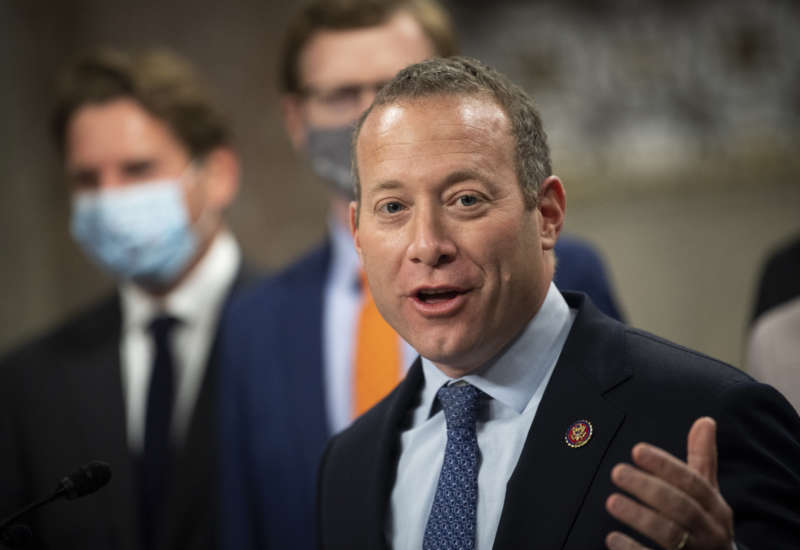New investigations by The Intercept have revealed that the group of Democrats who have been trying to obstruct the $3.5 trillion reconciliation bill have ties to billionaire-funded dark money group No Labels, which offered two representatives in the group hundreds of thousands of dollars to advance their agenda.
The group of conservative Democrats who were dead set on obstructing the Democratic leadership’s plan to ensure that the $3.5 trillion reconciliation bill was passed through Congress offered one reason for their campaign: they simply wanted to ensure that the bipartisan infrastructure bill was seen as a win for President Joe Biden, they said.
They painted their stance as though their push had nothing to do with the reconciliation bill, which contains plans to increase taxes on the wealthy and corporations. “Time kills deals,” they argued in an op-ed earlier this week, saying that progressives and Democratic leadership were holding the infrastructure bill “hostage.”
But The Intercept has uncovered that the group’s members may have darker reasons for their opposition to the timeline proposed by Democrats and the White House.
On Thursday, the publication revealed that No Labels essentially bribed members of the group to help advance the appearance of the group’s “Unbreakable Nine” label. No Labels reportedly offered to raise $200,000 for Representatives Carolyn Bourdeaux (D-Georgia), and Vicente Gonzalez (D-Texas) if they cancelled their appearances at a fundraiser held by House Speaker Nancy Pelosi (D-California) last Saturday.
Ultimately, Bordeaux attended the fundraiser, but Gonzalez cancelled his appearance. Both a spokesperson for Gonzalez and No Labels have denied that there was an agreement to fundraise separately for the lawmakers.
The reason behind the offer was that No Labels wanted the group to provide a united front against Pelosi’s agenda to pass the bills concurrently. No Labels, meanwhile, is against the bill because of its proposals to hike taxes on the rich, reports The Intercept.
“The larger package includes significant tax increases on the private equity barons and other wealthy individuals who fund No Labels, and the group has unleashed a flood of money in order to stop it,” wrote The Intercept.
The Intercept writes that No Labels may be opening the Democrats up to participating in potentially illegal actions with the dark money group’s offers. “On the question of whether accepting campaign funds as a ‘reward’ for the right vote on the infrastructure bill would break the law, a Congressional Research Service summary explains that accepting such money could indeed be off-limits, if it was given because of how they voted.”
The group had taken a victory lap on Tuesday, after Pelosi made a small concession to pass a rule ensuring a floor vote on the infrastructure bill by September 27, despite the fact that it wasn’t much of a win for the conservative Democrats. They gathered in a large Zoom meeting with dozens of No Labels donors to celebrate their win.
“You should feel so proud, I can’t explain to you, this is the culmination of all your work. This would not have happened but for what you built,” Rep. Josh Gottheimer (D-New Jersey), the group’s leader, told the representatives and the donors on the call. “It just wouldn’t have happened — hard stop. You should just feel so proud. This is your win as much as it is my win.”
No Labels, as well as the conservative lobby group U.S. Chamber of Commerce also indirectly revealed what is likely the true reason for the group’s opposition to the reconciliation/infrastructure plan earlier this week. Both praised the conservative Democrats not for moving up the timeline for the infrastructure bill, but for supposedly separating the infrastructure and reconciliation bills.
“The Unbreakable Nine have now broken this link [between the two bills] as Pelosi can no longer use the infrastructure bill as leverage to force Democratic moderates to vote for a reconciliation bill,” Liz Morrison, co-executive director of No Labels, wrote in a private memo to allies, The Intercept discovered.
Though none of the members of the group have said outright that this was their motivation, it would make sense that they didn’t want to come out directly against the reconciliation bill; Senators Joe Manchin (D-West Virginia) and Kyrsten Sinema (D-Arizona) have caught flack from fellow Democrats, progressives and the media in recent months for their stated opposition to the $3.5 trillion price tag for the reconciliation package despite its popularity among the public and their party.


